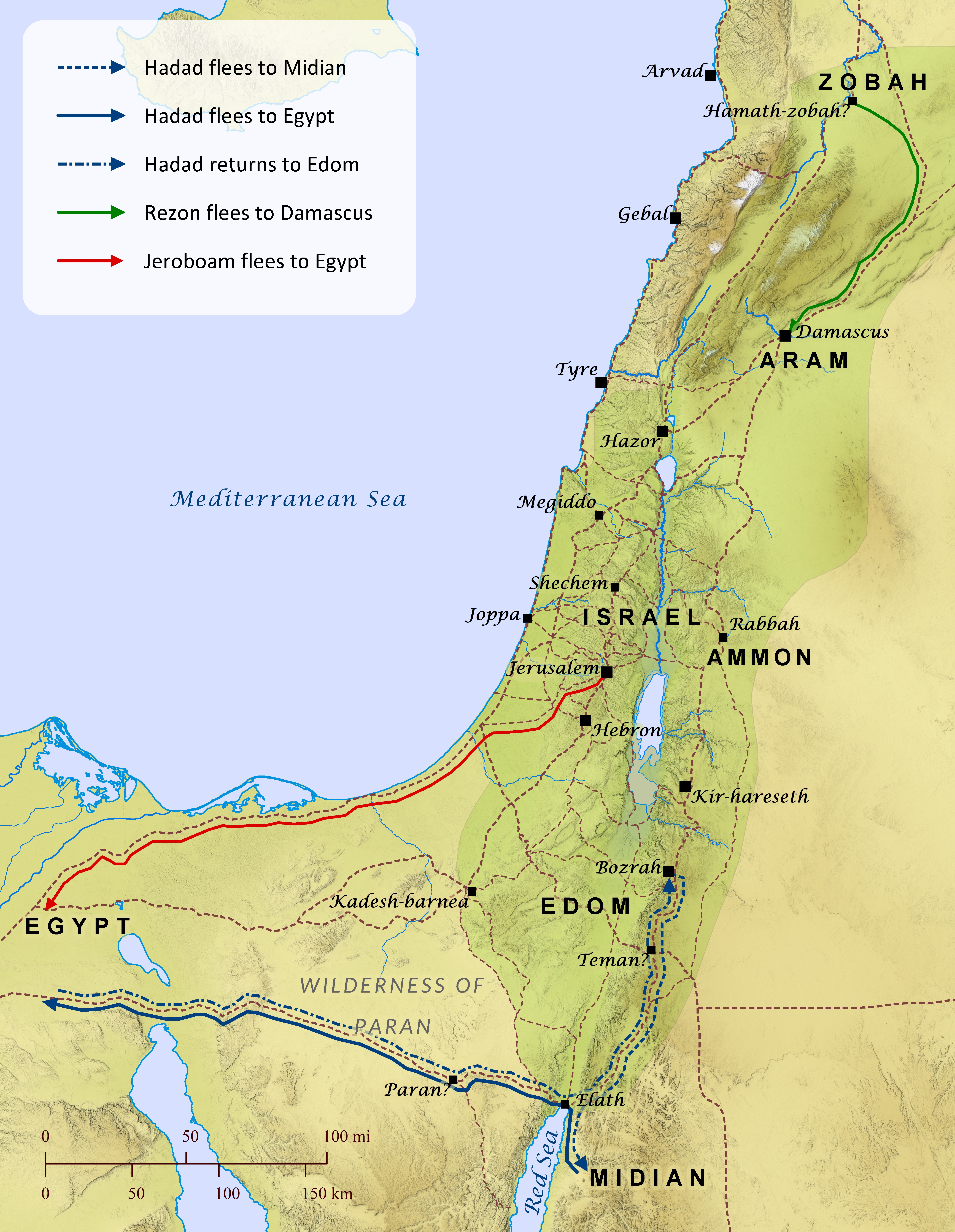Readers’ Version
Literal Version
11:26 God’s promise to Yarave’am/Jeroboam
26 Nebat’s son Yarave’am (Jeroboam), an Efratite from Tseredah also rebelled against the king. (His widowed mother Tseruah was one of Shelomoh’s servants.) 27 This is the background about how it started: Shelomoh had built the raised terrace and had repaired a gap in the wall of the city of David his father. 28 Shelomoh had noticed Yarave’am as a strong and hard-working young man, so he’d appointed him as supervisor over all the forced labour from Menashsheh and Efrayim’s regions. 29 One time when Yarave’am was away from Yerushalem, the prophet Ahiyyah the Shilonite met him on the road. He was wearing a brand-new a new cloak, and there was just the two by themselves in the countryside. 30 Ahiyyah then pulled the new cloak off his shoulders and tore it into twelve pieces, 31 and told Yarave’am, “Take ten pieces for yourself, because this is what Yisrael’s god Yahweh says, ‘Listen, I’m about to tear the kingdom away from Shelomoh’s control, and I’ll give the[fn] ten tribes to you. 32 The one tribe[fn] will be for him, for the sake of my servant David and for the sake of Yerushalem city which I’ve chosen from all the tribes of Yisrael. 33 This is because they’ve abandoned me. Instead they’ve bowed down to the Tsidonians’ God Ashtoret, to the Moabite god Kemosh, and to the Ammonite God Milkom. They’re no longer following my instructions or doing what they know I’ve said is right—not obeying my statutes or my judgements like the king’s father David did. 34 But I won’t take the entire kingdom off him, but rather I’ll leave him as a leader while he’s still alive for the sake of my chosen servant David, who obeyed my commands and my statutes. 35 However, I’ll take the kingship away from his son and I’ll give the ten tribes to you to rule. 36 I’ll give Shelomoh’s son one tribe to rule so that one of David’s descendants will always rule in my chosen city Yerushalem because it’s associated with my name. 37 But I’ll use you, and you’ll be able to reign over the area where you want to rule—you’ll become king over Yisrael. 38 Then if you’ll listen to everything that I command you, and walk on the right path and do what pleases me and keep my statutes and my commands, just like my servant David did, then I’ll be with you. I’ll establish a dynasty for you just like I did for David, and I’ll give Yisrael to you. 39 I’ll make David’s descendants suffer because of Shelomoh’s behaviour, but not forever.’ ”
40 Shelomoh tried to kill Yarave’am, but he left the area and fled to Egypt. He remained in Egypt under the protection of King Shishak until Shelomoh’s death.
11:31 Most English translations leave out this ‘the’ (which is in the Hebrew). However, we suspect that both Ahiyyah and Yarave’am knew exactly which of the ten tribes it would be.
11:32 It would have been obvious at the time that this was referring to Yehudah. (The unmentioned twelfth tribe is Benyamin—the youngest brother and the smallest tribe.)
27 And_this the_reason why he_raised a_hand in/on/at/with_king Shəlomoh he_built DOM the_millo he_closed_up DOM the_breach_of the_city_of Dāvid his/its_father.
28 And_the_man Yārāⱱəˊām was_a_mighty_man_of strength and_he/it_saw Shəlomoh DOM the_young_man if/because_that was_doing_of (of)_work he and_appointed DOM_him/it to/from_all/each/any/every the_forced_labour_of the_house_of Yōşēf/(Joseph).
29 and_he/it_was in/on/at/with_time the_that and_Yārāⱱəˊām he_had_gone_out of_Yərūshālam/(Jerusalem) and_met ʼAḩiyyāh DOM_him/it the_Shilōnī the_prophet in/on/at/with_road and_he was_covering_himself in/on/at/with_cloak new and_two_of_them by_themselves_of in/on/at/with_field.
30 And_ ʼAḩiyyāh _took_hold in/on/at/with_cloak the_new which on/upon/above_him/it and_tore_it two_plus ten pieces.
31 And_he/it_said to_Yārāⱱəˊām take to/for_yourself(m) ten pieces if/because thus YHWH he_says the_god_of Yisrāʼēl/(Israel) see_I am_about_to_tear_away DOM the_kingdom from_hand_of Shəlomoh/(Solomon) and_give to/for_yourself(m) DOM ten the_tribes.
32 And_the_tribe the_one it_will_belong for_him/it for_the_sake_of servant_of_my Dāvid and_for_the_sake_of Yərūshālam/(Jerusalem) the_city which I_have_chosen in/on/at/with_her from_all the_tribes_of Yisrāʼēl/(Israel).
33 Because that abandoned_me and_worshipped to_ˊAshtoret the_god_of the_Tsīdonī/(Sidonians) to_Kəmōsh/(Chemosh) the_god_of Mōʼāⱱ and_to_Malkām the_god_of the_people_of ˊAmmōn and_not they_have_walked in/on/at/with_ways_of_my for_doing the_right in/on/at/with_sight_of_my and_regulations_of_my and_judgements_of_my as_Dāvid his/its_father.
34 And_not I_will_take DOM all_of the_kingdom out_of_hand_of_his if/because ruler make_him all_of the_days_of his/its_life for_the_sake_of Dāvid servant_of_my whom I_chose DOM_him/it who he_observed commands_of_my and_regulations_of_my.
35 And_take the_royalty from_hand_of his/its_son and_give_it to_you DOM the_ten_of the_tribes.
36 And_to_son_of_his I_will_give a_tribe one so_as to_belong a_lamp for_Dāvid servant_of_my all_of the_days to/for_my_face/front in/on/at/with_Yərūshālam/(Jerusalem) the_city which I_have_chosen to_me to_put name_of_my there.
37 And_DOM_you I_will_take and_reign in/on/at/with_all that it_will_desire soul_of_your and_be king over Yisrāʼēl/(Israel).
38 And_it_was if you_will_listen_to DOM all_of that command_you and_walk in/on/at/with_ways_of_my and_do the_right in/on/at/with_sight_of_my by_keeping regulations_of_my and_commands_of_my just_as he_did Dāvid servant_of_my and_I_will_be with_you and_build to/for_yourself(m) a_house enduring just_as I_built for_Dāvid and_give to/for_yourself(m) DOM Yisrāʼēl/(Israel).
39 And_afflict DOM the_offspring_of Dāvid on_account_of this nevertheless not all_of the_days.
40 and_ Shəlomoh/(Solomon) _he/it_sought to_kill DOM Yārāⱱəˊām/(Jeroboam) and_ Yārāⱱəˊām _he/it_rose_up and_fled Miʦrayim/(Egypt) to Shiyshaq the_king_of Miʦrayim and_he/it_was in/on/at/with_Miʦrayim until the_death_of Shəlomoh.


